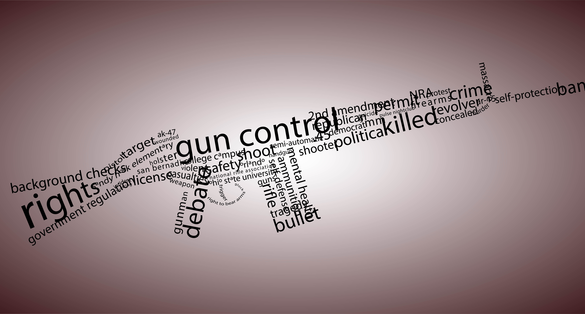Because of advancements in the media, Generation Z is exposed to the news more often than previous generations have been, increasing their stress levels toward certain topics.
She left school that morning through hallways lined every 50 feet with officers carrying assault rifles.
She tried to sleep that night, yet her mind was convincing her that she kept seeing the shooter in her bedroom doorway.
She went back to school days later with her focus on potential hiding places instead of what was being written on the board.
She lives life alert now, constantly watching doorways and the movements of people around her.
After experiencing the Noblesville shooting on Friday, May 25, 2018, Aubrie Ginther’s life changed forever.
Aubrie is currently a freshman at Ivy Tech Community College in Kokomo, Indiana, but when the shooting happened, she was a junior at Noblesville High School.
She was sitting in her nutrition and wellness class at around 11 a.m. that Friday morning when her principal spoke over the intercom.
“The principals voice was shaking this time,” Aubrie says. “He called a code red.”
By this time, Ginther and her classmates had already heard announcements for a code yellow, meaning the doors to the school are locked but people are free to roam, and a code orange, meaning all classroom doors are locked and no one can leave the room, so when the code red was called, she understood that the situation was dangerous.
“We had heard rumors of a shooter being in our school, so we had no choice but to fear the worst.”
Aubrie and her classmates piled their desks in front of the door, shuffled through a kitchen area, and escaped through a door in the back. They ran toward Noblesville East Middle School where they boarded two buses and soon relocated behind a bus garage to remain hidden.
“I was texting my family group chat telling them what was happening, but reassuring that I was safe,” Aubrie says. “About 20 minutes into that, my phone died.”
Aubrie and other Noblesville students were dismissed from school early that day and sent home with their families.
“I got to the main door and saw a crowd of parents – many crying,” Aubrie says. “Community members and church leaders passed out water and snacks, dozens of police vehicles lined the roads, a helicopter was flying above us, and hundreds of cars were parked everywhere. It was chaos.”
Aubrie is just one of over 228,000 students to have experienced a school shooting since Columbine in 1999, according to the Washington Post’s database on schools shootings.
School shootings not only affect those directly involved, but those who hear and know about them as well. In fact, according to a study published by the American Psychological Association, 75% of Generation Z said that mass shootings are a significant source of stress, and 72% say the same about school shootings.
Since Columbine in 1999, 773 schools have experienced gun related incidents and 341 people have been killed, according to the Center for Homeland Defense and Security.
Gen Z grew up with this information at their fingertips with the rise of the media over the internet, and because of this, they are the first generation to have been exposed to school shootings in this way.
“There’s this one known phenomenon in criminal justice in which the more you hear about crime, the more dangerous the world seems,” says Dr. William Betts, director of counseling and health services at Ball State.
Betts says that if a mass shooting were to occur today, like the ones that have occured in Florida and Nevada, and even in Noblesville, Indiana, students would know about it almost immediately because of social media and technology.
“Your news channel will cover it 24 hours a day for three days,” Betts says, “and you can be bathed in all of that information. In fact, it’s kind of hard to get away from it because it will come to you.”
Because of Gen Z’s exposure to these news outlets, as well as social media apps like Twitter, Instagram, Facebook, and Snapchat, they experience increased levels of stress and anxiety toward things like school shootings, Betts says.
In fact, more than half of Gen Z members who are in school said that they experience stress when considering the possibility of a school shooting.
“And yet,” Betts says, “you know the risks of being caught in a mass shooting are really low.”
“Many times before the shooting, I had seen other victims say, ‘You never think this would happen to you,’” Aubrie says. “That statement is beyond true.”
Mass shootings do not only affect Gen Z and their mental health, but their stress follows them through the doors of their schools.
And despite school security efforts to ease the stress of students, 22% of Gen Z students say security measures in their school have “somewhat or significantly increased” their stress toward school shootings.
“I think that’s very jarring for folks to think about this otherwise safe place as being dangerous,” Betts says.
To Aubrie, Noblesville High School was one of the safest places she could be.
“I believe that experience changed my perception of school and definitely took away my sense of security,” Aubrie says. “I never even wanted to be at school.”
But Aubrie says she believes Gen Z’s stress toward school shootings will encourage them to help make a change.
“By experiencing school shootings first hand, it has pushed Gen Zers to fight for their safety and for gun laws, hopefully pushing lawmakers to act on it,” Aubrie says.
And after her experience, Aubrie maintains a hopeful mindset, saying that she is determined to not let the shooters win.
“We can’t let these few negative occurrences alter our lives for the worse because that is exactly what they’re meant to do,” Aubrie says. “We need to use this harmful experiences to better ourselves and our communities.”




